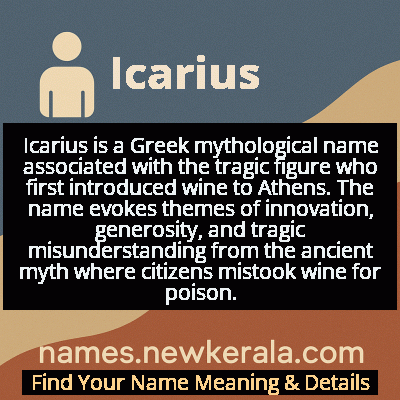Icarius Name Meaning & Details
Origin, Popularity, Numerology Analysis & Name Meaning of Icarius
Discover the origin, meaning, and cultural significance of the name ICARIUS. Delve into its historical roots and explore the lasting impact it has had on communities and traditions.
Name
Icarius
Gender
Male
Origin
Greek
Lucky Number
8
Meaning of the Name - Icarius
Icarius is a Greek mythological name associated with the tragic figure who first introduced wine to Athens. The name evokes themes of innovation, generosity, and tragic misunderstanding from the ancient myth where citizens mistook wine for poison.
Icarius - Complete Numerology Analysis
Your Numerology Number
Based on Pythagorean Numerology System
Ruling Planet
Saturn
Positive Nature
Ambitious, efficient, realistic, and authoritative.
Negative Traits
Materialistic, stressed, confrontational, and can be overly ambitious.
Lucky Colours
Dark blue, black.
Lucky Days
Saturday.
Lucky Stones
Blue sapphire, amethyst.
Harmony Numbers
2, 4, 6.
Best Suited Professions
Business leaders, managers, financial services, law enforcement.
What People Like About You
Leadership, determination, organizational skills.
Famous People Named Icarius
Icarius of Athens
Mythological Figure
First mortal to receive the gift of wine from Dionysus and introduce it to Athens
Icarius of Sparta
Mythological King
Father of Penelope (wife of Odysseus) in some traditions
Icarius (Astronomy)
Celestial Body Namesake
Lunar crater named after the mythological figure
Name Variations & International Equivalents
Click on blue names to explore their detailed meanings. Gray names with will be available soon.
Cultural & Historical Significance
Extended Personality Analysis
Those bearing the name Icarius typically exhibit traits of innovation, generosity, and tragic misunderstanding. They are natural pioneers who often introduce novel ideas or technologies to their communities, mirroring the mythological Icarius's role in bringing wine to Athens. Their generous nature compels them to share their discoveries freely, though this openness can lead to misunderstanding when others fail to grasp the significance or proper use of their innovations. There's often a visionary quality to their thinking that places them ahead of their time, creating a gap between their understanding and that of their contemporaries. This can result in feelings of isolation or being misunderstood, much like the original Icarius who suffered for sharing Dionysus's gift. Despite potential setbacks, they maintain an essential optimism and trust in human nature, believing that their contributions will ultimately be recognized and valued. The combination of innovative spirit, generous sharing, and the risk of tragic misunderstanding creates individuals who serve as important catalysts for progress, even when they personally bear the cost of being visionaries in conventional societies.
Modern Usage & Popularity
In contemporary times, the name Icarius remains exceptionally rare and is primarily confined to academic circles, classical studies enthusiasts, and parents seeking highly distinctive names with profound mythological roots. Its usage is almost nonexistent in mainstream naming practices, appearing only in specialized contexts such as mythology departments, classical literature references, or among families with strong connections to Greek heritage. The name's association with tragic misunderstanding and innovation makes it appealing to those who appreciate complex mythological narratives, though its somber connotations and difficulty of pronunciation for non-Greek speakers likely prevent wider adoption. It occasionally surfaces in creative works or scholarly discussions but maintains its status as an obscure, culturally rich choice rather than a practical given name in modern societies.
Symbolic & Spiritual Meanings
Icarius symbolizes the profound dichotomy between innovation and cultural readiness, representing the tragic fate that often awaits those who introduce transformative concepts to unprepared societies. He embodies the archetype of the misunderstood benefactor whose gifts are rejected through ignorance and fear. Symbolically, the name speaks to the eternal tension between progress and tradition, enlightenment and superstition, generosity and ingratitude. It serves as a powerful metaphor for all innovators, scientists, and visionaries whose contributions are initially met with suspicion or violence. The story also represents the dual nature of knowledge and technology - how the same innovation that can bring joy and enlightenment (like wine) can also lead to destruction when misunderstood or misused. Furthermore, Icarius symbolizes the personal cost of being ahead of one's time and the tragic gap that often exists between visionary thinking and conventional understanding in human societies.

